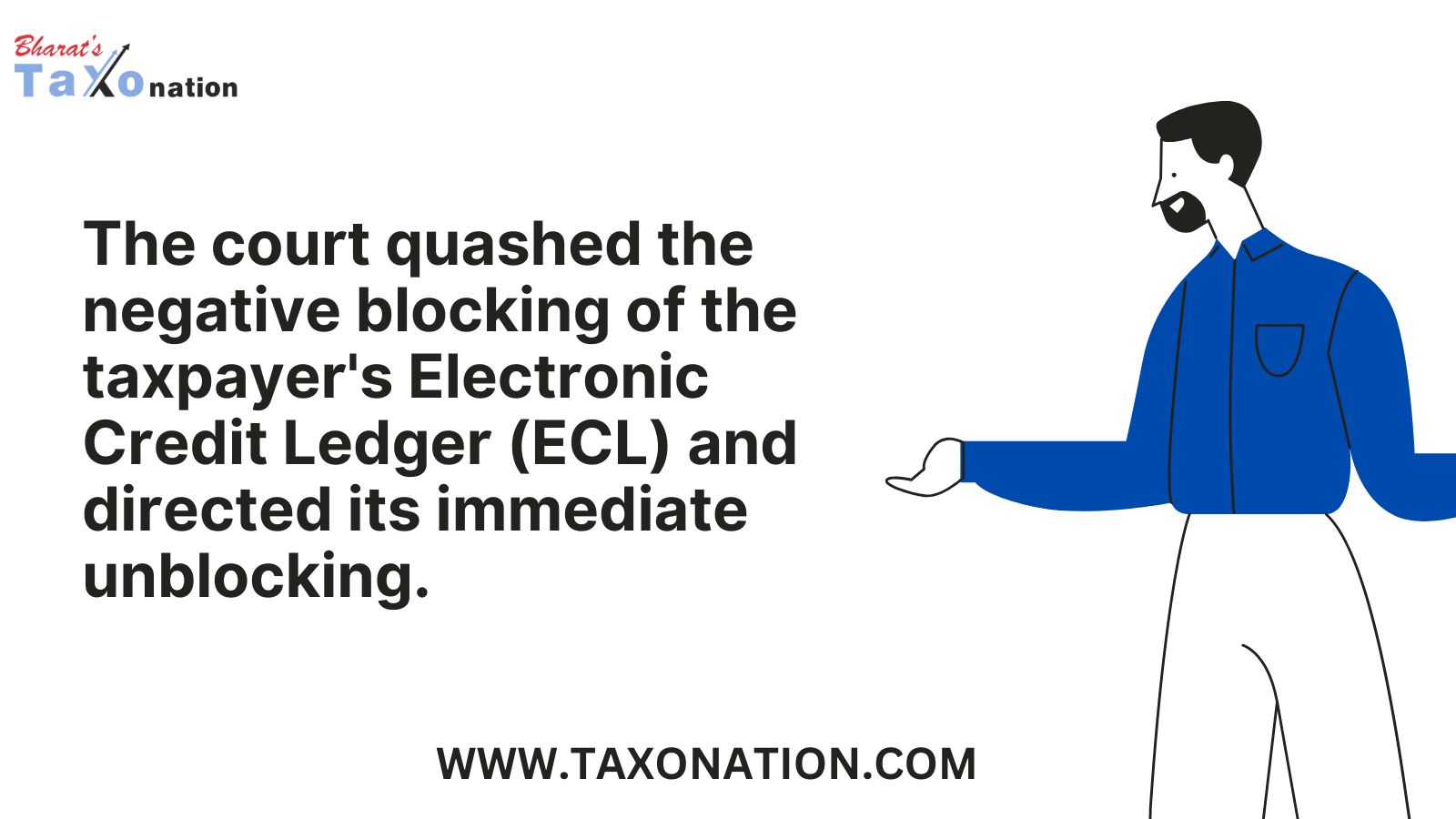The court quashed the negative blocking of the taxpayer's Electronic Credit Ledger (ECL) and directed its immediate unblocking.
26 Nov, 2024
5400 View
The writ petition sought the unblocking of the petitioner’s Electronic Credit Ledger (ECL), which was negatively blocked by the tax authorities, creating an unjustified negative balance of INR 36,18,911. The petitioner argued this action violated the CGST Act and Rules, as such blocking exceeded the permissible credit in the ECL. The Court, relying on the precedent set in Best Crop Science (P) Ltd. vs. Commissioner, ruled that negative blocking under Rule 86A is unsustainable and directed the respondents to lift the block immediately.
Issue-The petitioner challenged the imposition of a negative balance on their Electronic Credit Ledger (ECL) by the tax authorities.The petitioner argued that the negative blocking was unjustified and exceeded the scope of Rule 86A of the CGST Rules, 2017.
Key Facts of the Case
-
Background of the Blocking:
- On April 29, 2024, the ECL of the petitioner had a balance of INR 7,60,581.
- The tax authorities blocked INR 43,76,492 from the ECL, resulting in a negative balance of INR 36,18,911.
- The petitioner argued that this action was unsustainable and beyond the scope of Rule 86A of the CGST Rules.
-
Legal Framework Involved:
- Rule 86A of the CGST Rules empowers authorities to block the utilization of Input Tax Credit (ITC) in the ECL if there are reasons to believe that the credit has been fraudulently availed or is ineligible.
- No prior show cause notice is required for such blocking since Rule 86A is an emergent provision meant to safeguard government revenue temporarily.
-
Core Issue:
- The petitioner challenged the concept of negative blocking, where the authorities blocked more ITC than was available in the ECL at the time of the order.
Legal Precedent: Best Crop Science (P) Ltd. vs. Commissioner [2024 TAXONATION 2489 (DELHI)]
The Court referred to the landmark judgment in Best Crop Science (P) Ltd. vs. Commissioner, which clarified the following:
-
Temporary Nature of Blocking:
- Blocking of ITC is an interim measure and cannot substitute for recovery proceedings under Sections 73 or 74 of the CGST Act.
- Such blocking is valid only if the Commissioner has reasons to believe that the credit is ineligible or fraudulently availed.
-
Scope and Limitations of Rule 86A:
- Rule 86A does not permit negative blocking, i.e., disallowing debit from the ECL exceeding the ITC balance available at the time of the blocking order.
- Authorities must proceed under the proper recovery mechanisms outlined in the CGST Act for determining tax liabilities.
-
Duration and Review of Blocking:
- The blocking order under Rule 86A cannot extend beyond one year.
- If the conditions for blocking no longer exist, authorities are required to lift the restriction.
-
Implications of Negative Blocking:
- Negative blocking forces taxpayers to replenish their ECL by validly availing ITC equivalent to the blocked amount. This approach effectively treats the blocking order as a tax recovery order, which is not permissible under Rule 86A.
Court’s Decision in the Present Case
After evaluating the arguments and the binding precedent, the Court concluded that:
- The negative blocking of INR 36,18,911 in the petitioner’s ECL was unsustainable and beyond the scope of Rule 86A.
- The blocking order effectively imposed a larger financial burden on the taxpayer, contrary to the legislative intent behind Rule 86A.
- The petition was allowed, and the tax authorities were directed to lift the negative blocking of the ECL forthwith.
GST Case Law Karuna Rajendra Ringshia Proprietor RR Enterprises
Citation-2024 TAXONATION 2990 (DELHI)
CLICK HERE TO READ FULL CASE LAW/DOWNLOAD FROM ABOVE GIVEN PDF OPTION
OR
SUBSCRIBE GST E-LIBRARY (INDIA'S HIGHEST GST CASE LAW DATA)
FOR MORE UPDATE ON GST/ IT JOIN OUR FREE WHATSAPP GROUP BY CLICKING ON THIS LINK https://chat.whatsapp.com/C8VB6F6VHme3A061UDQKhj

Comment: